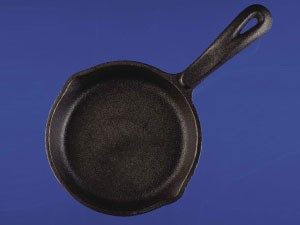Cooking Ribeye In Cast Iron
© Jupiterimages/Comstock/Thinkstock Chefs and foodies swear by them. But are cast iron skillets truly superior to non-stick, aluminum, or stainless
 © Jupiterimages/Comstock/Thinkstock
© Jupiterimages/Comstock/Thinkstock
Chefs and foodies swear by them. But are cast iron skillets truly superior to non-stick, aluminum, or stainless steel? Here are some reasons that might inspire you to make the switch:
Cast Iron Is Healthier
Non-stick frying pans are coated with substances that could potentially give off toxic fumes when heated. And who wants toxins in their French toast? When properly seasoned, cast iron skillets offer a non-stick, chemical-free cooking surface that actually boosts the iron content in foods.
They're Versatile
Cast iron skillets can go from stovetop to oven with no problem, which means no more transferring ingredients from frying pan to baking pan in multi-step recipes.
They're Long-Lasting
Cast iron doesn't scratch, so you can use any kind of cooking utensils on it without fear of damaging the pan. Heavy and durable, there's virtually no way to break or even bend a cast iron skillet out of shape.
They're Affordable
Name brand cookware and quality stainless steel pots and pans can cost over three times as much as cast iron skillets. A 12-inch cast iron skillet will generally set you back about $30, while the same sized stainless steel pan can cost upwards of $100.
They're Best at Browning
For fried or sautéed dishes browned to the perfect crisp, a non-stick pan can't touch a cast iron skillet. What's more, die-hard skillet fans swear that the continuous seasoning of the cooking surface adds a flavor dimension that stainless steel simply can't deliver.
Sources: NaturalNews.com, NYTimes.com
Cooking Ribeye In Cast Iron
Source: https://www.rd.com/article/5-reasons-to-try-a-cast-iron-skillet/
Posted by: harristhiblases.blogspot.com

0 Response to "Cooking Ribeye In Cast Iron"
Post a Comment